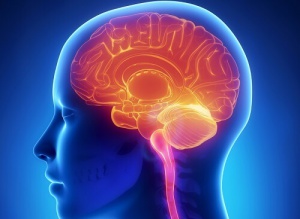11 Daily Habits that Damage the Brain

You can’t figure out what’s going on: you’re tired, you can’t concentrate, you forget things. But the strangest thing is that it only happens when you do certain things. Sometimes it happens when you wake up early and don’t eat anything until the afternoon. It might occur when you get too stressed out at work. The problem is that you might be engaging in habits that damage the brain.
Everything you do influences your body in a certain way. What’s more, certain activities prevent normal brain functioning and even damage its structure. Now imagine that you repeat these actions daily for years and years. Can you guess what happens?
Your own habits are breaking down your brain! But don’t worry, there’s still time. Changing your lifestyle can guarantee good health for both your brain and body. In this article, I’m going to talk about these terrible daily habits that damage the brain.
My brain and I
Your brain is an extremely complex and delicate organ that takes direct or indirect action in all bodily processes. It regulates homeostatic functions like heartbeats, fluid balance, blood pressure, hormonal balance and body temperature. It’s also responsible for movement, cognition, learning, memory, human emotions. Therefore, it’s central to your health.
According to numerous scientific studies, the way in which one lives ones life could damage brain cells. This can happen over the short or long-term. If it’s in the long term, it can lead to the development of degenerative diseases or other conditions.
On the other hand, when you engage in healthy activities, you active your brain and make it health again. Some examples of healthy activities are eating a balanced diet and doing physical exercise. Let’s get to work and learn about 11 daily habits that damage the brain.
11 Daily Habits that Damage the Brain
1. Not eating breakfast
Breakfast is the most important meal of the day because it influences your performance, endurance, and emotional situation significantly. During the first few hours of the day, the brain allots nutrients. This allotment helps it to continue “managing” the physiological processes after its long fast.
If you don’t supply it with energy, it will need to use reserves. This means that it will have to put in even more effort to maintain correct functioning.
Skipping breakfast could cause general lack of energy, loss of concentration, and bad memory. Not only that, but it can affect you in other ways. Experts have found it can contribute to bad mood and poor physical and intellectual performance. Eat a substantial and healthy breakfast.
2. Smoking
The terrible habit of smoking considerably reduces brain matter. It also restricts the supply of oxygen to the brain. It has been linked to the development of neurodegenerative diseases like Alzheimer’s disease.
Also, heterocyclic amines that are released during cigarette combustion interfere with correct DNA reproduction. To make a long story short, this leads to mutations that can cause cancerous cells.
3. Elevated sugar consumption
If your diet mostly consists of refined sugars, white flour, fried food, and packaged food, you might be doing yourself harm. This is especially true for diets that also lack sufficient amounts of vegetables, fruits and fiber. Such diets promote an accumulation of harmful substances in the body.
This increases the risk of developing tumors, warps immune system functioning, can cause malnutrition, and interferes with neurological development. The food you tend to eat can be one of the habits that damage the brain.
4. Constant exposure to contaminated environments
The brain needs a constant supply of oxygen. Different toxic substances could interfere with the exchange of gasses and the transportation and of oxygen to the cells. This could lead to a reduction in the efficiency of your brain.
5. Not sleeping enough
You need eight hours of sleep a night in order for your brain to rest. Sleep also contributes to the correct execution of the metabolic processes that produce energy. Cellular renovation occurs while you’re dreaming, too. Depriving yourself of sleep accelerates the death of brain cells over short term. What’s more, it’ll keep you tired and in a bad mood all day.
6. Overeating
Eating more food than the body needs causes an accumulation of residual substances in the form of fats. It also hardens the cerebral arteries, which impacts its correct functioning.
7. Alcohol
Alcohol can have negative effects on any organ. The parts of your body it tends to hurt the most are the nervous system, the liver, and the heart. It impacts the chemical reactions that take place in the brain as well.
Alcoholism also kills neurons and reduces the speed with which nerve impulses are transmitted. Not only it a part of the habits that damage the brain, but it could also hurt the rest of your body.
8. Violent reactions or premature stress
Stress causes several reactions in the nervous system. Some of these reduce mental capacity and increase the risk of suffering from strokes and heart attacks.
9. Covering your head while sleeping
Sleeping with your head covered increases the concentration of carbon dioxide in your brain. At the same time, it reduces the amount of oxygen you have, which could cause harmful effects for your brain.
10. Pushing the brain during an illness
Working or studying a lot while you’re sick is damaging because the body’s energy is being re-routed from the healing. Forcing the brain to work too hard during this period could reduce the body’s efficacy. Aside from that, it can weaken the immune system even more. This makes it easier for you to fall prey to even more types of illnesses.
11. Lack of mental stimuli and exercise
There’s nothing quite like thinking, having intelligent conversations, reading books, or working through a word search to stimulate your brain. Activities like these increase learning capacity and memory. Not only that, they might also help you shorten your reaction time to stimuli.
Final advice
Take care of your brain by adopting a healthy lifestyle. Try to avoid those habits that damage the brain and instead get into these:
- Eat appropriately, incorporating delicious fruits and vegetables that will stimulate brain activity. Experts also recommend that you eat fish rich in Omega-3 fatty acids. These fats improve communications between neurons.
- Drink 3 or 4 cups of tea or small cups of coffee throughout your day to improve your short term and long term memory. This habit also reduces your risk of suffering from Alzheimer’s and Parkinson’s diseases.
- Exercise regularly.
- Avoid drugs, tobacco, and alcohol.
- Sleep as much as necessary.
- Fill yourself with positive thoughts.
All cited sources were thoroughly reviewed by our team to ensure their quality, reliability, currency, and validity. The bibliography of this article was considered reliable and of academic or scientific accuracy.
- VV.AA. (2008). Relación entre la calidad del desayuno y el rendimiento académico en adolescentes de Guadalajara (Castilla-La Mancha).http://scielo.isciii.es/scielo.php?script=sci_arttext&pid=S0212-16112008000500011
- VV.AA. (2013). Omisión del desayuno, estado nutricional y hábitos alimentarios de niños y adolescentes de escuelas públicas de Morelos, México. https://www.tandfonline.com/doi/full/10.1080/19476337.2013.839006
- Centro de investigación Biomédica de España. https://ciberned.es/noticias/blog/214-fumar-aumenta-el-riesgo-de-sufrir-alzheimer-o-demencia.html
- Vargas Marcos, Francisco. (2005). LA CONTAMINACIÓN AMBIENTAL COMO FACTOR DETERMINANTE DE LA SALUD. http://scielo.isciii.es/scielo.php?script=sci_arttext&pid=S1135-57272005000200001
- Nilton Custodio., Lira, David. (2018). Los trastornos del sueño y su compleja relación con las funciones cognitivas. http://www.scielo.org.pe/scielo.php?script=sci_arttext&pid=S0034-85972018000100004
- VV.AA. (2015).Azúcares adicionados a los alimentos: efectos en la salud y regulación mundial. Revisión de la literatura. http://www.scielo.org.co/pdf/rfmun/v64n2/v64n2a17.pdf
- VV.AA. (2014). Principales daños sanitarios y sociales relacionados con el consumo de alcohol. http://scielo.isciii.es/scielo.php?script=sci_arttext&pid=S1135-57272014000400004
- VV.AA. (2017). La autopercepción del estrés psicológico se asocia con el ataque isquémico transitorio e ictus minor. Un estudio de casos y controles. https://www.elsevier.es/es-revista-neurologia-295-avance-resumen-la-autopercepcion-del-estres-psicologico-S0213485317303572
This text is provided for informational purposes only and does not replace consultation with a professional. If in doubt, consult your specialist.












